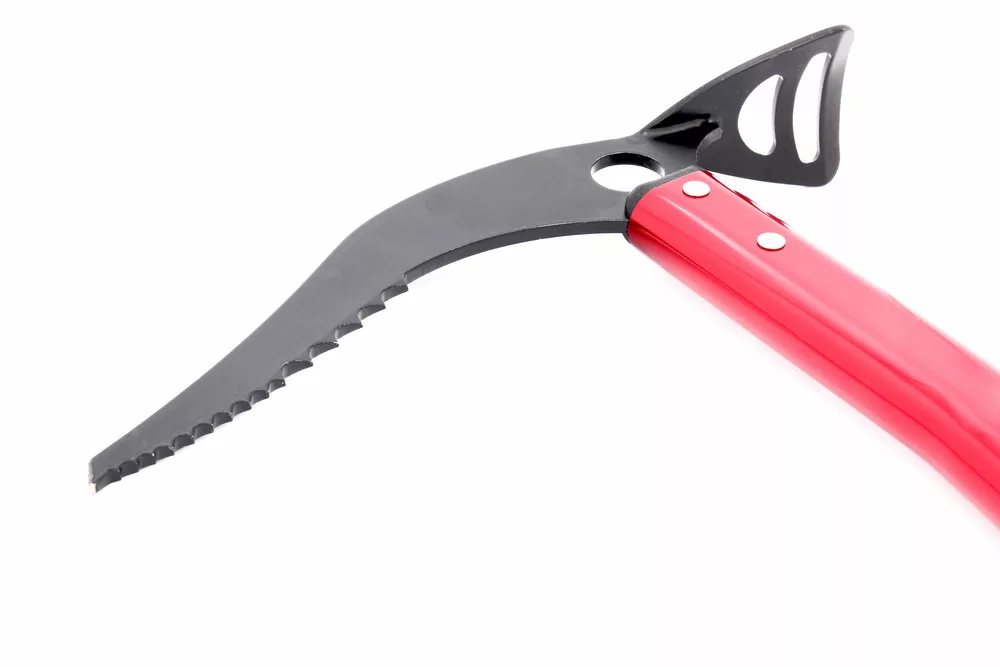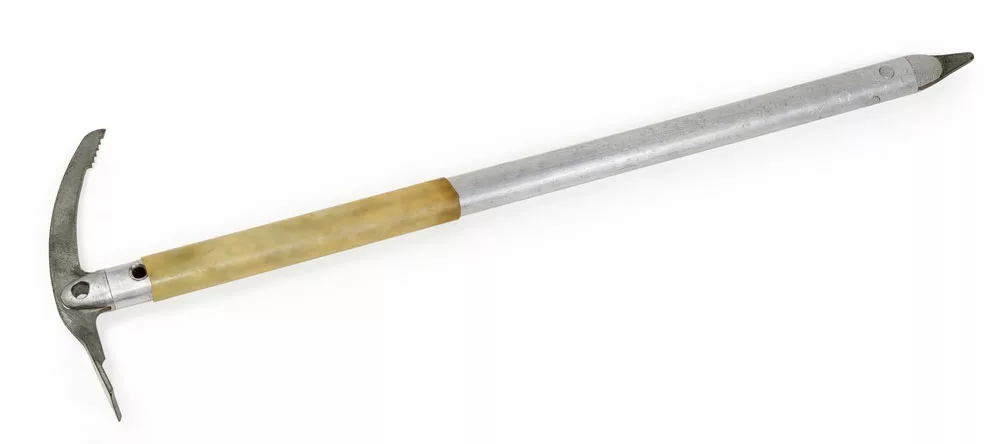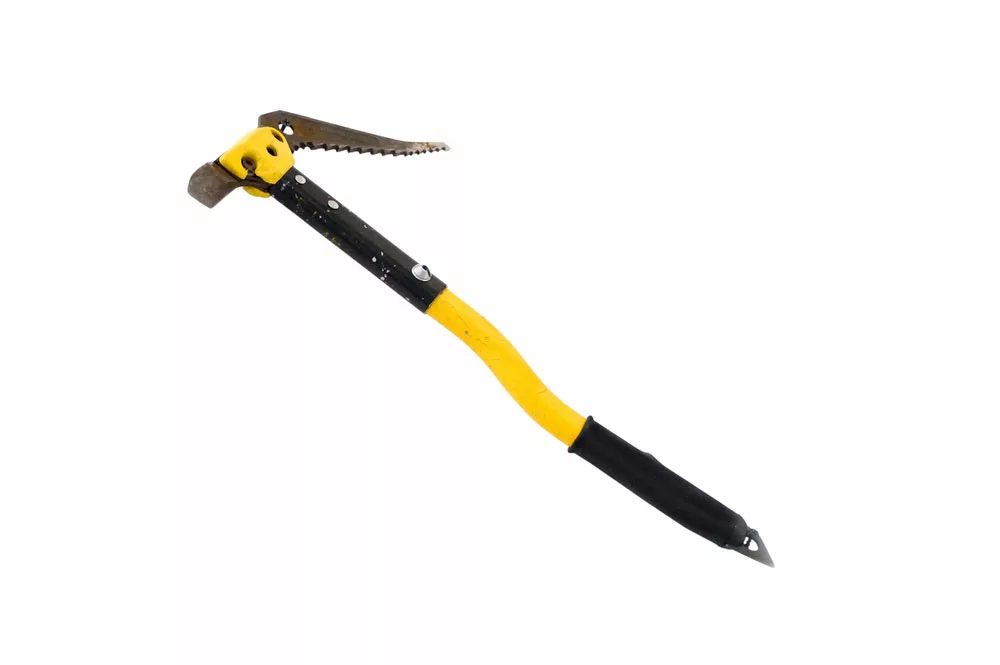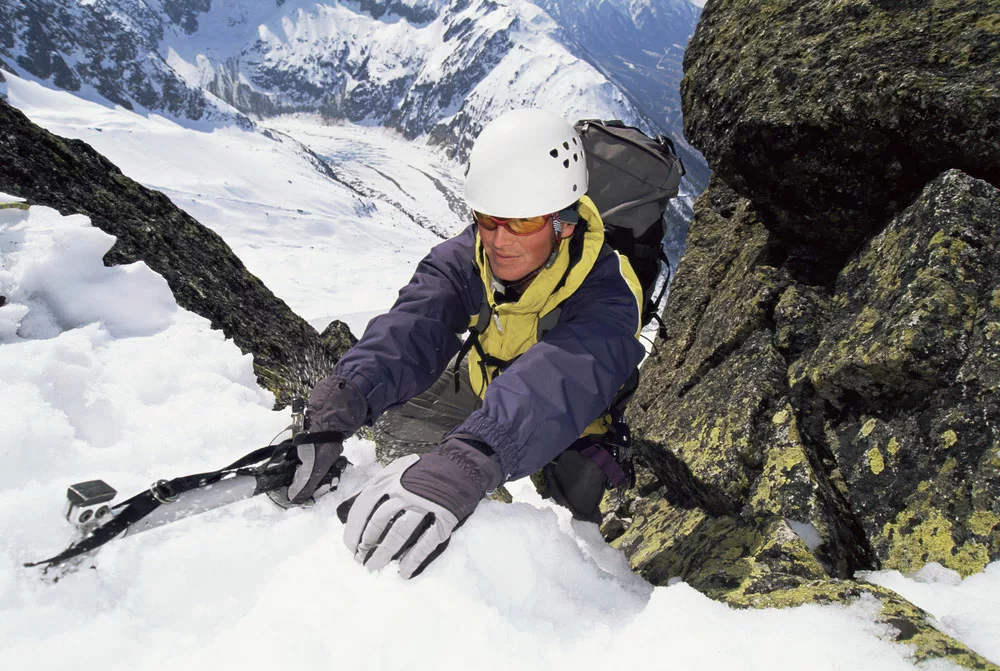If you love alpine or winter climbs, you cannot underestimate the power of using an ice axe. Mountaineers use an ice axe for maneuvering through snowy mountains.
However, misusing your ice axes could be fatal since you could obtain injuries from their sharp edges.
In this article, you will learn the parts of an ice axe and the difference (between an ice axe and an ice tool).
Thereafter, we’ll discuss the process of using an ice axe.
Let’s hop in.
The Anatomy of an Ice Axe
Picks
The head’s sharp end. It is usually tooth-shaped and slightly curved. Additionally, you can use it to self-arrest in case of your trip.
Adze
It is on the opposite side of the pick with a broader and flat end. It has a small metal shovel for digging through the snow.
Head
The topmost part of the ice axes. Usually, the shorter side suspends the adze and picks on each side. Furthermore, it connects with the shaft.

Ice axes head
Shaft
The longer part of ice axes are for gripping when maneuvering through steep slopes.

Ice axe with a long straight shaft.
Spike
The sharp side of an ice axe gives you a good grip as you walk through icy slopes. You’ll find it at the bottom of the shaft.

Sports ice axe with a spike.
Difference (Ice Axe and an Ice Tool)
Design
| Ice Axe | Ice Tool | |
| Head | -Slightly curved. | -A lot more curved. |
| Pick | -The wider angle between the pick and the shaft. | -Has a smaller angle between the pick and the shaft. |
| Spike | -When using the ice axe as a walking stick, the spike is for balance | -In some instances, the spike is for cutting out ice or snow. |
| Leash | -Most ice axes have leashes | -In contrast, some lack leashes. |
| Shaft | -Straight-Also, its length ranges from 55-70 centimeters | -Curved- Additionally, Its Length varies from 45-55 centimeters |
Usage
| Ice axe | Ice tool |
| – Used to climb less steep terrains and snowy routes. | – For vertical ice climbing, e.g., ice walls. |
| – For cutting steps to the ice- Sometimes used for self-arrest– One only needs one ice axe | – For vertical climbing- You cannot use it for self-arrest- One needs two ice tools, on either hand. |
How to Use an Ice Axe
To Walk Or Hike
- Hold the ice axe upright with the shaft and spike vertically.
- Next, clamp your fingers around the head and shaft between the index and middle finger.
- Hold your axe in either hand for self-rescue.
- When walking along a slope, the axe should be on the hand facing upslope.
- Next, thrust the ice axe’s spike into the snow to start walking.
- To create a step, use your boots inclined into the slope for stability.
- Make a few steps till the ice axe is on your side.
- Ensure the ice axe’s spike is firm on the snow.
- Once stable, remove the ice axes and thrust them forward.
- Maintain the ice axes position and walk until it’s beside you.
- Occasionally change the hand holding the ice axes when walking in a zigzag and turning.
- Maintain the ice axes on your upslope when turning, and ensure it’s in front of you.
- With your new hand, move the ice axes forward.
Walking Down a Slope
- Thrust the spike of the ice axes into the snow on your side
- Besides, when descending, push your weight into the snow using your heels.
- Subsequently, take one or two steps until you’re in front of the ice axes.
- Next, pull out the ice axe and thrust it beside you again once you achieve stability.

Mountaineers walking using ice axes
To Chop Or Cut Steps Into Hard Snow Or Ice
- Clutch the ice axes by the shaft.
- When cutting the step, do not bend over excessively.
- Position your body sideways in that your dominant hand faces upslope.
- Use the adze when chopping the ice, and swing the axes parallel to your body’s side to avoid injuries.
- As you cut a step into the snow, keep the surrounding intact.
- Use your boots to deepen the cut. Also, ensure your cut accommodates both feet.
- Step up with both feet, keeping the one facing upslope.
- Keep your weight on your downslope feet when chopping a step.
To Scramble Or Climb Up A Steep Slope
- In this case, do it on fours, like moving up a vertical wall.
- Also, one hand holds the ice axes, and the other holds the pick.
- Hold the ice axes by the head or by the shaft.
- In addition, control the ice axes with your dominant hand to strengthen your grip.
- With the shaft on the slope, thrust the pick into the snow ahead.
- Move your feet one after the other.
- Move the ice axes to a higher position once you stabilize your feet.

Climbing a steep slope
To Perform Self-Arrest
- To begin, firmly grasp the ice axes with both hands to reduce the impact stopping your fall.
- Once the ice axes pick is inside the snow, add more pressure to the head.
- Also, hold the ice axes close to your chest.
- Stop your fall using your ice axes and not your feet.
- Once your fall has become slow, stop yourself with your feet.
To Build A T-slot Anchor For Belaying
- Find a firm snow area to set up your anchor.
- Afterward, trace out the letter T with the vertical part facing downslope. The axe goes into the horizontal part.
- Next, drill the T-shaped hole in the ice.
- While you cut the T-shape, ensure the ice/snow around it remains intact.
- Also, dig the snow about 30 cm deep.
- Attach the belay to the ice axe’s shaft using a clove hitch. Keep the clove hitch slightly closer to the head.
- Additionally, ensure the belay material faces the vertical part of the ‘T’ while the pick faces down to the ice.
- Strongly press the ice axe into the snow while stomping the ice.
- Emphatically, with the ice axe strongly in place, align the sling to the direction of the force.
- For a direct belay, use the T slot anchor. Also, you can do a body belay by attaching yourself to it.
Conclusion
In conclusion, using an ice axe is important for every mountaineer, as we have seen above. Also, it performs numerous functions, such as walking and hiking. Lastly, in case you have any inquiries, feel free to reach us.
